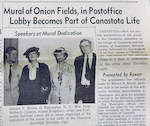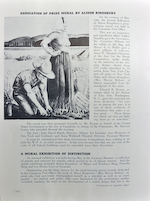The Onion Fields
In 1941, the year Pearl Harbor was attacked, Alison Mason Kingsbury was awarded a mural commission for the Canastota, New York, Post Office with a proposal that clearly drew upon the widely popular work of the Mexican muralists in both content and form. It was a piece that valorized the work of the local onion workers, many of whom where immigrants from Russia, and was aptly titled The Onion Fields. Its subjects, a male and a female farmer, are a clear departure from the artist's earlier figures, filled out as they were in a stocky body types reminiscent of both Mexican and Soviet art.
While President Roosevelt's Works Progress Administration (WPA) had funded hundreds of post office murals in the wake of the Great Depression, A. M. K.'s commission was part of the "one percent rule," a shell of the New Deal program that required that one percent of all federal building funds go towards artistic decoration, a fact that publicity for the project went to pains to point out as the WPA lost popularity in the face of communist fears.
 |
Alison Mason Kingsbury. The Onion Fields. Canastota Post Office, New York. [1942] [zoom] Unlike many of the post office murals born out of federal support for artists from the 1930s and 1940s, A. M. K.'s The Onion Fields still graces Canastota Post Office, located just east of Syracuse. From the collection of Alison and Richard Jolly |
 |
The Post-Standard. "Mural of Onion Fields in Postoffice Lobby Becomes Part of Canastota Life." [1942] [zoom] The unveiling of The Onion Fields was front page news in the Syracuse Post-Standard on May 16, 1942. The artist is pictured second from the right. Division of Rare and Manuscript Collections |
 |
The Syracuse Museum of Fine Arts. Quarterly Bulletin. "Dedication of Prize Mural by Alison Kingsbury." [1942] [zoom] In conjunction with the unveiling of The Onion Fields, the Syracuse Museum of Fine Arts held an exhibition of "murals and cartoons for murals" by A. M. K. and three other local artists. Division of Rare and Manuscript Collections |